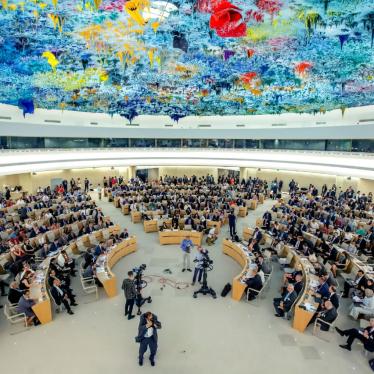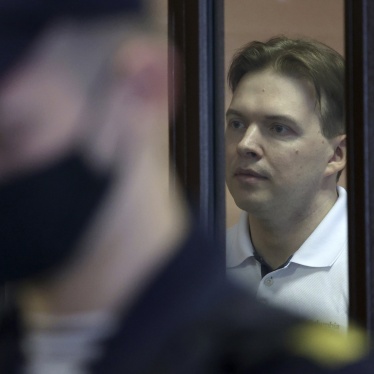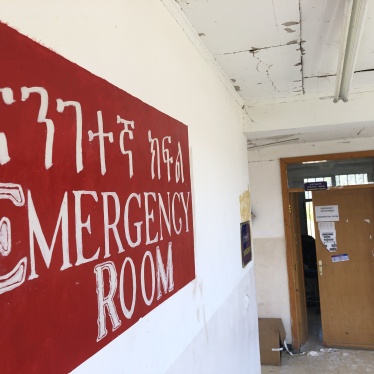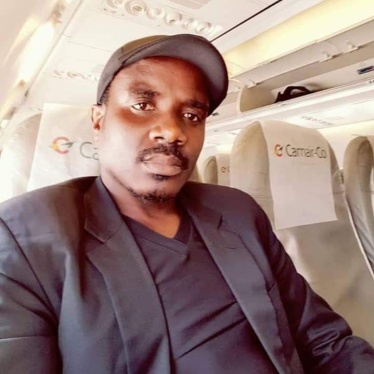I am writing today to urge the OSCE to send international monitors to Uzbekistan to observe the trials of those arrested for their alleged involvement in the events in Andijan in mid-May.
I am writing today to urge the OSCE to send international monitors to Uzbekistan to observe the trials of those arrested for their alleged involvement in the events in Andijan in mid-May. We noted with interest the commitment that President Karimov gave to you during your recent visit to Tashkent that the Andijan trials “would be open to interested parties and that the OSCE Centre in Tashkent would have the opportunity of observing such trials.” (OSCE Press Release, July 29, 2005) We welcome this commitment and urge the OSCE to send international monitors, as well as staff from the OSCE Centre in Tashkent, to all trials that involve defendants accused of having been involved in the Andijan events.
The Andijan Massacre and its Aftermath
On May 13, 2005, Human Rights Watch estimates that government forces massacred hundreds of unarmed civilians in Andijan. In response to the takeover of government buildings by gunmen and a massive demonstration attended by unarmed Andijan residents, government security forces used excessive and indiscriminate force, opening fire without warning and killing and wounding unarmed people. Government snipers shot people as they fled the scene, and armored personnel carriers (APCs) mowed people down. After the peak of the carnage, government forces returned to the scene and executed the wounded where they lay. (See the Human Rights Watch report “Bullets were Falling Like Rain”)
In the immediate aftermath of the massacre, government authorities closed off the square where much of the killing had taken place. The bodies were removed and signs and evidence of the massacre were erased. Authorities washed the blood from the street and painted over the bullet-riddled buildings of the surrounding neighborhood. The government stationed armed guards around the local hospitals, and forbade access to the hospitals, morgues and cemeteries. Foreign journalists were detained by police, threatened, and forcibly evicted from the city. Law enforcement officials confiscated journalists’ notes, video and tape recordings, and photographs—vital evidence of the details of the massacre. In the hours and days that followed, government road blocks were thrown up, Andijan became a closed city, with access granted only to select few with government permission. Human rights defenders and journalists from outside Andijan were prevented from entering to investigate the circumstances of the massacre or speak to witnesses.
In the intervening months since the massacre, the government of Uzbekistan has undertaken a wide-scale crackdown on anyone with information about the massacre and engaged in an intense effort to cover up all evidence of government responsibility for the killings. The government has aggressively pursued the “truth-tellers,” human rights defenders, independent journalists, and political activists who have attempted to spread information about the actual events of May 13 and the days that followed. Members of these groups have been beaten, detained and arrested on spurious charges, put under surveillance, and harassed and threatened. Human rights defenders from Andijan in particular have been forced to abandon their work or flee the country.
In place of the truth, the Uzbek government has worked tirelessly to present a fictitious version of events to absolve government forces of all responsibility for the massacre. Later this month, Human Rights Watch will publish a report based on our most recent fact-finding mission to Andijan in July that documents the government’s cynical attempts to silence witnesses and manufacture evidence. Through coercive measures, including torture, the government is producing “evidence” of “Islamic extremists’” responsibility for the deaths and injuries of May 13. The authorities have rounded up hundreds of Andijan residents, including participants in the May 13 demonstration as well as individuals who have little or no direct knowledge of the violence that took place on May 13. The authorities detain Andijan residents for several days, subject them to interrogation, torture them, and force them to sign false confessions. The Karimov government is working furiously to rewrite history, to produce a new account of the Andijan events, and to bury the facts that contradict the government’s version.
Uzbekistan’s Record: Persecution and Denial of the Right to a Fair Trial
Already prior to the Andijan massacre, the Uzbek government had a well-documented record of persecution of political opponents and independent Muslims. For more than 10 years, the Uzbek government has imprisoned thousands of people on charges of “religious extremism” or “attempt to overthrow the constitutional system.” Thousands of people in prison on religious charges are not implicated in or even charged with any violent act, let alone terrorism. Those imprisoned include people who attended mosques not registered with the government, who were followers of imams who fell out of favor with the authorities, or who belonged to unregistered religious organizations. Police and security agents have tortured many people to compel them to confess to being members of “fundamentalist” groups, and have harassed and threatened their families. Courts have handed down prison sentences of up to 15-20 years, following grossly unfair trials.
In general, defendants in Uzbekistan rarely have a fair trial. Defendants are routinely denied the most fundamental due process guarantees and access to defense counsel. Convictions are often based on fabricated evidence. The prospects for a fair trial dim even further for those brought up on political charges, such as anti-state activities, terrorism, or religion-related charges. The particular judicial bias that politically sensitive cases face is detailed in the Human Rights Watch report entitled Creating Enemies of the State: Religious Persecution in Uzbekistan. Human Rights Watch found that defendants charged with political and religion-related violations face additional problems and obstacles to obtaining due process during the trial phase. The country’s judiciary is not independent of the executive. Judges display marked deference toward and bias in favor of procurators. They approach defendants with hostility and suspicion rather than presumption of innocence. Corruption in the judiciary is rampant.
Persons accused of “religious extremism” and other politically sensitive charges are denied the right to examine witnesses against them. An aggressive defense is the rare exception that proves the rule: defense counsel is sidelined, fearful, and passive. Defendants themselves must stick to the “script” of confession and contrition or else they are silenced. Judges routinely ignore or inadequately address court testimony regarding fabrication of evidence and coercive methods—including torture—used to procure defendants’ testimony to police.
Against this backdrop of repression and rewriting of history, it is extremely unlikely that any person brought to trial for crimes allegedly committed during the Andijan events can hope for a fair trial. It is incumbent upon the international community, including in particular the OSCE given its geographic scope and established expertise in trial monitoring, to ensure that the trials are closely monitored by international observers and violations of international due process are carefully documented and publicized.
We understand that the first Andijan trials are expected to begin in September. We therefore ask you, as a matter of the utmost urgency, to use your good offices to ensure that the OSCE and its member states deploy international representatives to monitor these trials on behalf of the OSCE and report to OSCE participating states regarding the conduct of these trials, including any procedural violations. We also urge you to seek assurances from the Uzbek government that, consistent with President Karimov’s promise to you, the trials will be open to interested parties such as local and international human rights groups and that the government will facilitate the work of such groups, including by providing visas where needed.
As you may know, Human Rights Watch has had a permanent presence in Uzbekistan, through our Tashkent office, since 1996. We have monitored recent developments in Uzbekistan, including the Uzbek government’s cover-up efforts and the crackdown on human rights defenders, political activists and others. We would very much welcome an opportunity to discuss our findings and concerns with you, and will be contacting your office in the coming days to see if such a meeting can be arranged when I will be in Vienna in late September.
Thank you for your attention to this extremely serious matter.
Sincerely,
Holly Cartner
Executive Director
Europe and Central Asia division
Human Rights Watch
Cc: OSCE Ambassadors
Ambassador Christian Strohal, Office of Democratic Institutions and Human Rights, OSCE






